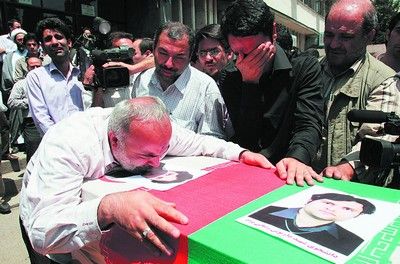Iran accuses Israel, US of assassinating scientist
 0 Comment(s)
0 Comment(s) Print
Print E-mail
Xinhua, July 25, 2011
E-mail
Xinhua, July 25, 2011
Iranian officials on Sunday accused the United States and Israel of being involved in the assassination of an Iranian academic who was shot dead on Saturday in front of his house.
 |
|
On July 24, Iranian officials?accuse the United States and Israel of being involved in the assassination of an Iranian academic who was shot dead on?July 23?in front of his house.?[Photo:Sina.com] |
Iran's Majlis (parliament) Speaker Ali Larijani called the assassination of an Iranian scholar as a "U.S.-Zionist terrorist act."
"Yesterday's U.S.-Zionist terrorist act that targeted one of the elites of Iran is another instance demonstrating the U.S. hostility (toward Iran)," Larijani was quoted as saying by the satellite Press TV Sunday.
Larijani said that "the U.S. has resorted to terrorist acts because of failing in its adventures in the region."
The Iranian speaker also called on Iran's security forces to respond to terrorists with "stronger will," said the report.
Also, the rapporteur of the National Security and Foreign Policy Commission of Iran's parliament, Kazzem Jalali, condemned the assassination of the Iranian scientist and took the U.S. and Israel responsible for the killing of the Iranian elites, local Fars news agency reported.
"Assassination of the scientific elites means that enemies of the Iranian nation are desperate," Jalali told reporters on Sunday.
"32 years after the victory of the Islamic Revolution, the Iranian nation is now well informed of the identity of those who are behind such terrorist attacks," Jalali was quoted as saying.
"They (Iranians) know that Americans and Zionists are behind the assassination of Iran's scientific elites," he added.
On Sunday, 200 Iranian lawmakers issued a statement condemning the assassination of the Iranian scientist and terror attempts in the country, the state IRIB TV reported.
"The United States and Zionist regime are responsible for these crimes," the statement said, urging the country's security officials to seriously confront the perpetrators of the terror acts in the country.
Tehran Governor Morteza Tamaddon called the assassination of the Iranian academic "a U.S.-Israeli project," semi-official Mehr news agency said on Sunday.
On Saturday, local media reported that "Dariush Rezaei," PhD of nuclear Physics and a university professor, was killed by motorcyclists in front of his home in eastern Tehran.
According to the reports, the assassinated scientist was an expert linked to Iran's Atomic Energy Organization and a nuclear physics professor at Mohaqeq Ardebili University in Iran's northwestern Ardebil city.
Later reports, however, corrected their earlier news saying that "Dariush Rezaeinejad," 35, worked for the Iranian Defense Ministry.
The victim majored in electro-techniques at Tehran's Khajeh Nasir University, Fars said on Sunday.
No group or individual has claimed responsibility for the attack and no reports have been issued about the arrests of the suspects so far.
In January 2010, the Iranian nuclear scientist and the Physics professor at the prestigious University of Tehran, Massoud Ali- Mohammadi, was killed by a remote-controlled bomb attached to a motorbike parked near his house.
In November 2010, another Iranian nuclear scientist Majid Shahriar was also killed by a bomb attached to his car on the way to his work.
In January, Iran said it dismantled an Israeli spying network and arrested a group of people who were linked to the assassination of its nuclear scientist Massoud Ali-Mohammadi.
Iran's Foreign Ministry Spokesman Ramin Mehmanparast said that Iran would legally sue Israel over assassinating the nuclear scientist.
Also, in the month, Iranian Vice President Nasrin Soltankhah announced that Iran formed security teams to protect its nuclear scientists.
Protecting the Iranian scientists was seriously considered by the country's security systems, Soltankhah said, adding that the Iranian scientists were also trained to confront the possible dangers which may threat their lives.
The Iranian authorities have been accusing the United States and Israeli intelligence services of being behind the assassinations.
Western powers suspect Iran of seeking to build nuclear weapons despite Tehran's claims that it will be used only for generation of civilian energy.





